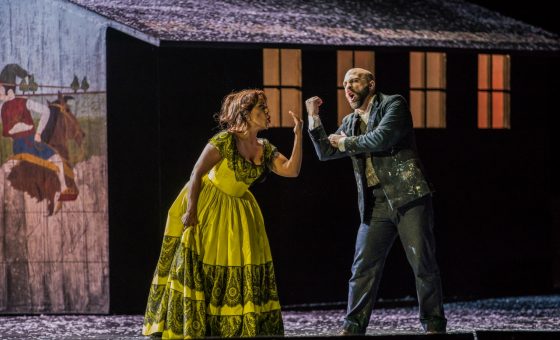

By Howard Reich
October 7, 2018
Tears, laughter and a great deal of splendid — particularly from the female leads — launched Lyric Opera of Chicago’s 64th season on Saturday evening.
Puccini’s “La Boheme” was the vehicle, and though some might groan at the thought of encountering the old warhorse once again, this new, sleekly modern production reminded listeners of the score’s perpetual melodic allure and dramatic pull. Its central lovers may be all too obviously doomed from the outset, but how cold must a heart be not to respond to its final, tragic pages?
Director Richard Jones’ concept — in Lyric’s co-production with the Royal Opera House Covent Garden and Teatro Real Madrid — embraced a lean, freshly contemporary aesthetic. You could see it in Stewart Laing’s mostly minimalistic sets, and you couldn’t miss it in the risqué touches that emerged periodically. The humor that Jones established early in the production and sustained even as disaster approached pointed to the intimate, human scale of this staging.
And yet for all the many achievements and one striking misfire in Lyric’s first new “Boheme” production in 46 years, this one turned on a single element above all: soprano Maria Agresta’s performance as Mimi. Returning to Lyric after singing Liu in “Turandot” last season, Agresta sounded radiant, thoroughly inhabiting the persona of the ailing heroine she portrayed.
From the first moment her Mimi entered the stage, stooped a bit from already failing lungs but tonally sumptuous across her vocal range, Agresta commanded attention — regardless of what else was happening around her. By the time Mimi finally expired, the loss seemed monumental, and we were left nearly as desolate as her tortured lover, the poet Rodolfo.
Michael Fabiano, making his Lyric debut in that role, immediately engaged listeners with the first aria he sang to Mimi, “Che gelida manina,” producing a sweet tone and ardent delivery. But when Agresta responded with an aria of her own, “Mi chiamano Mimi,” hearts immediately broke at the tenderness of this singing and the extraordinary innocence of the character Agresta was creating. Her Mimi was all goodness and vulnerability, making her grim fate all the more painful to behold.
When Fabiano and Agresta performed their first duet, declaring their love for one another in “O soave fanciulla,” they sang with unanimity of phrase and spirit. But Fabiano sounded most compelling when sharing vocal lines with Agresta, the disarming openness of her manner and the remarkable tonal and technical control of her singing intensifying his already charismatic performance.
Musetta and Marcello, the opera’s other troubled couple, reflected a similar dynamic: a vivid female voice and personality ennobling the work of her male partner. Soprano Danielle de Niese, who sang Roxane Coss in Lyric’s world premiere of “Bel Canto” in the 2015-16 season, was all fire and ferocity as Musetta, and not simply because of the red-hot dress that clung to her. Watching de Niese torment baritone Zachary Nelson’s Marcello with the rhapsodic character of her singing and the lusty manner of her movement, it wasn’t difficult to understand why her lover was beside himself with jealousy.
De Niese’s Musetta personified sensuality in sound and gesture. So much so that when she removed her underwear (without violating public decency) and tossed it at Marcello during a battle of the sexes in Café Momus, we had no difficulty believing she would do such a thing. In de Niese’s interpretation, this Musetta easily would have done much more. Her throaty rendition of Musetta’s famous waltz, “Quando me’n vo,” very nearly made one forget the throngs of other actors crowding the scene. The devil was in her eyes and her voice.
The two couples turned in their deepest, darkest work in the third act, as a weakened Mimi and a guilt-ridden Rodolfo tried to repair their fracturing bond, while Musetta and Marcello tore at each other. In the work of these singers, their grand quartet, “Addio, dolce svegliare,” shed light not only on the particulars of each couple’s relationship but also on the ephemeral nature of love itself. Each pair, after all, was passionately in love but showed it in autobiographical ways. Fabiano yielded his best acting of the production, by far, in this scene, his Rodolfo looking very nearly crazed at the sight of Mimi’s decline.
Once again, though, Agresta triumphed at the opera’s finale, her muted reprise of the music that marked her first meeting with Rodolfo now steeped in tragedy. Her death scene, too, proved chillingly believable (by operatic standards).
Director Jones deserves considerable credit for the persuasiveness of so much of this production, especially the ingeniously choreographed Café Momus scene, with so much movement and action in a stage crowded with actors. Throughout, the bonhomie among Rodolfo, Marcello, Colline (played by Adrian Sampetrean) and Schaunard (Ricardo Jose Rivera) felt natural and brought forth comedic impulses in an opera that can easily be overshadowed by gloom.
Unfortunately, the set for the garret in which Rodolfo and his fellow starving artists gather took stripped-down simplicity several degrees too far. It looked not just spare but unfinished and, therefore, unconvincing.
Conductor Domingo Hindoyan made an impressive Lyric debut leading the orchestra in an accompaniment that was responsive to the singers, with vibrant work from the chorus (prepared by Michael Black) and characteristically nimble and exuberant singing from the Chicago Children’s Choir (led by Josephine Lee). Lighting designer Mimi Jordan Sherin worked wonders in creating beams of moonlight that streamed into the garret, nowhere more effectively than on Mimi’s hauntingly pallid face.
But the illuminated, ever-changing expressions were the work of singer-actor Agresta, whose sight and sound will not soon be forgotten.
Opera note: Contract negotiations between Lyric Opera of Chicago and the musicians’ union are ongoing, according to a Lyric representative.
3.5 stars.
Lyric Opera’s production of “La Boheme” runs through Oct. 20 and again Jan. 10 through Jan. 25 at the Civic Opera House, 20 N. Wacker Drive; ticket prices vary; 312-827-5600 or www.lyricopera.org.

Leave a Reply